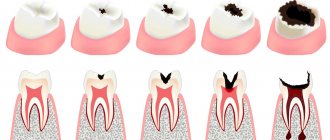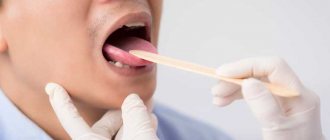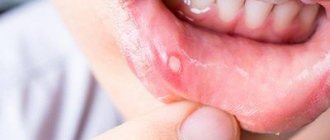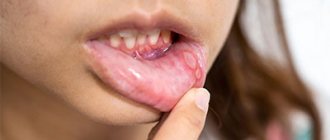Glossitis: symptoms and treatment in adults
Contents:
What is glossitis
Symptoms of glossitis
Causes of glossitis in adults
Types of glossitis in adults
How and with what to treat glossitis in adults
Prevention of glossitis
Doctor's advice
Answers on questions
There are many factors that lead to pathologies in the oral cavity. Glossitis - what is it? This is a term that combines various diseases of the tongue.
Symptoms of glossitis:
- pain when eating and moving the tongue;
- difficulty moving;
- color change, plaque appearance;
- swelling of the mucous membrane;
- deformation;
- loss of taste sensitivity (partial or complete);
- sensation of a lump in the throat, a foreign object in the oral cavity;
- the appearance of solid formations and compactions.
If these symptoms are detected, you should immediately contact dentistry in Moscow to avoid complications or the disease developing into chronic glossitis.
Glossitis
Folded glossitis
A folded tongue may be a normal variant or a manifestation of mutations in the genetic apparatus.
There is a high probability of this anomaly occurring in congenital pathologies of the central nervous system (Down's disease). A distinctive feature of the folded tongue are longitudinal and transverse folds. In this case, the longitudinal fold runs strictly along the midline of the tongue - from its tip to the root. Often a folded tongue is combined with macroglossitis (enlarged tongue) and areas of scaly peeling of the tongue.
Patients usually do not complain, but pay attention to the unusual appearance of the tongue. If atrophy of the tongue papillae is present, complaints of burning and loss of taste are possible. Bad breath often occurs due to food getting into the folds.
A folded tongue may be part of a set of symptoms when:
- acute gastritis;
- hypovitaminosis B;
- diabetes mellitus in combination with candidiasis;
- osteochondrosis of the cervical spine.
Atrophic glossitis
An inflammatory process of the mucous membrane of the tongue, which is accompanied by a decrease in the size of its papillae or their disappearance. As a result, the surface of the back of the tongue becomes red, smooth and shiny. Atrophic processes affect all tissues of the tongue, as a result of which its thickness decreases.
As the muscle volume of the tongue decreases, swelling and ulceration appear. The patient complains of a change in taste perception. soreness and bad breath.
Atrophic glossitis develops when:
- blood anemia (iron deficiency, B12 deficiency);
- hypovitaminosis (riboflavin - vitamin A, nicotinic acid - vitamin PP);
- streptococcal and fungal infections;
- HIV infections.
Hypoplastic glossitis
Damage to the mucous membrane of the tongue, which develops due to diseases of the gastrointestinal tract and lack of vitamins B2 (riboflavin) and PP (nicotinic acid). It is characterized by a decrease or disappearance of the papillae of the tongue, so the tongue has a “varnished” appearance, with bright spots and stripes.
If the absorption of vitamins B2 and PP in the intestine is impaired, unpleasant sensations occur: burning, tingling and pain in the tongue when eating.
Exfoliative glossitis
An inflammatory-dystrophic disease of the mucous membrane of the tongue, the etiology (cause) of which has not yet been definitively established. First described as "geographic tongue" and "benign migratory glossitis". Occurs in diseases of the gastrointestinal tract, helminthic infestations, a tendency to allergies and menopause. It is believed that hereditary factors and infectious diseases play a role in the development of the disease.
Exfoliative glossitis is characterized by the periodic appearance and disappearance of round or irregularly shaped red areas of epithelial exfoliation on the back of the tongue and lateral surfaces, surrounded by a bright rim. The exposed areas quickly restore their structure and appear elsewhere on the tongue.
These peelings do not bother the patient, but if the desquamation intensifies, a burning, tingling, tingling sensation appears, especially while eating. The tongue reacts to spicy and spicy foods, hot foods, and is easily infected due to the large area of exposed mucous membrane, which is devoid of protective properties.
Ulcerative glossitis
This pathology of the tongue occurs with infectious lesions of the mucous membrane, as well as common severe somatic diseases. It is characterized by the formation of ulcerative and erosive-ulcerative elements on various surfaces of the tongue, which occur with a pronounced pain symptom, significant dysfunction of the tongue (swallowing, chewing, speech), regional enlargement of the lymph nodes and symptoms of general intoxication of the body (malaise, headache, fever ).
In clinical practice, ulcerative glossitis occurs in the following conditions.
- Diseases of the cardiovascular system.
Decompensated course of hypertension, decompensated heart valve defects, large-focal myocardial infarction. Ulcers appear on the bluish surface of the tip and the anterior third of the tongue, along the midline.
- Chronic gastrointestinal diseases.
In this case, against the background of an ash-gray coating, painful ulcers form on the root of the tongue.
- Blood diseases.
Acute leukemia, aplastic anemia. Ulcerative-necrotic formations are located over the entire surface of the tongue.
- Behçet's disease.
Systemic disease of the mucous membranes of the body of unknown etiology. Multiple, painful aphthae and ulcers appear on the tongue.
- Incorrect prosthetics.
Bright red erosions and ulcers are located on the lateral surfaces of the tongue.
Villous glossitis
A chronic disease of the mucous membrane of the tongue, which is characterized by the proliferation of filiform papillae with their subsequent keratinization. This is predisposed to:
- diseases of the gastrointestinal tract (gastritis with increased and decreased acidity of gastric juice, diseases of the small and large intestines);
- infectious diseases (pulmonary tuberculosis);
- long-term antibacterial therapy;
- hereditary predisposition;
- Addison's disease;
- smoking, drinking alcohol;
- hemolytic anemia.
In this case, on the tongue in the midline, a triangular or oval-shaped lesion is visible (longitudinal size - 2-3 cm), covered with thickened filiform papillae, dark gray, brown, sometimes green.
Villous glossitis is accompanied by a sensation of a foreign body in the mouth, a gag reflex (intensifies when talking), impaired taste sensitivity and dry mouth.
Catarrhal glossitis
Acute damage to the superficial layers of the mucous membrane of the tongue. It is characterized by hyperemia (redness), swelling and pain (burning, discomfort when eating and talking).
Allergic glossitis
It is an inflammatory response of the tongue mucosa to the local action of allergens (often medicinal in nature). It develops acutely, with pronounced swelling of the tongue mucosa and severe pain. Hypersalivation (profuse salivation), fever, and enlarged regional lymph nodes are possible.
If there are dentures in the mouth, allergic glossitis occurs against the background of increased sensitivity to the materials from which the structure is made. On the lateral surfaces of the tongue that are in contact with the prosthesis, areas of redness of the mucous membrane appear.
Herpetic glossitis
Develops on the mucous membrane of the tongue when attacked by the herpes virus. It is accompanied by pronounced intoxication of the body (fever, malaise, muscle and headaches), regional enlargement of the lymph nodes (submandibular and parotid), severe soreness of the tongue, and disruption of its functions.
With herpetic glossitis, the tongue is covered with a dense coating that is difficult to remove; transparent, painful blisters filled with liquid are visible on the back of the tongue and its inner surface.
Interstitial glossitis
Sclerosing glossitis is one of the most severe forms of inflammation of the tongue, is a precancerous condition and requires immediate treatment. In this case, the pathological process occurs in two stages
At the initial stage, inflammation develops in all tissues of the tongue, as a result of which it increases in size.
Then, scar tissue forms at the site of inflammation, which leads to a decrease in the size of the tongue and its thickening. At the same time, the mucous membrane loses its papillae, becomes lumpy, and cracks and ulcers often form on it, which can become malignant.
Interstitial glossitis develops with syphilis and is chronic. In the absence of timely specific treatment, the muscle tissue of the tongue is completely replaced by connective tissue and a complete loss of tongue function develops.
Causes of glossitis in adults
There are many factors that lead to the occurrence of this pathology:
- infectious factor (viruses, bacteria, fungi);
- inflammatory gum diseases (periodontitis, gingivitis), carious teeth;
- poor oral hygiene;
- thermal, chemical burns;
- injury to the tongue with sharp objects, including sharp edges of fillings and dentures;
- smoking;
- reduced immunity.
Most often, patients have several factors that lead to
Treatment at home
Treatment of glossitis at home in adults and children should be carried out only after consultation with an experienced specialist, since independent experiments can only worsen the disease. If the disease is not severe, glossitis is treated with medications (prescribed by the doctor) at home, and the patient comes to the clinic for examinations throughout the entire period of rehabilitation. Doctors often prescribe treatment for glossitis with hydrogen peroxide, since it is an inexpensive and fairly effective antiseptic. The same can be said about chlorhexidine solution - one of the most common means of treating and preventing several types of glossitis.
Traditional medicine is actively used in the treatment of oral diseases, including glossitis. As a rule, various tinctures and decoctions are used. First of all, these are chamomile, calendula, basil and sage, which have antibacterial properties. Aloe, carrot and sea buckthorn juices help restore the supply of vitamins and also have a tonic and restorative effect.
Types of glossitis in adults
- Interstitial glossitis - occurs with syphilis, often leads to cancerous tumors of the tongue
- Gunterovsky - the initial symptom of pernicious anemia, manifests itself in the form of smoothing of the surface.
- Diamond-shaped tongue is a developmental anomaly.
- Folded is a congenital developmental anomaly.
- Hairy tongue - severe keratinization of filiform papillae, resulting in a black coating.
- Geographic (folded) - noticeable red spots, furrows.
- Ulcerative – bleeding ulcers and bad breath are observed.
- Catarrhal - a white dense coating covers the entire surface of the muscle.
Do not self-medicate, consult a doctor!
Don't wait for your condition to worsen!
Sign up
General symptoms of glossitis
The first signs of inflammation of the tongue are discomfort, burning and the sensation of a foreign body in the mouth. Subsequently, the tongue noticeably swells and acquires a burgundy or scarlet hue. The symptomatic picture of the disease may include:
- increased salivation;
- dullness or complete loss of taste;
- perversion of taste;
- pain and difficulty eating;
- slurred speech;
- the patient's desire not to use the tongue when creating sounds.
Symptoms of chronic glossitis
Chronic glossitis is characterized by persistent swelling and changes in the structure of the tissues of the tongue. With bacterial inflammation, hyperemia, soreness, swelling of the affected area and a local increase in temperature can be observed. The development of glossitis, which is of viral origin, is accompanied by the appearance of small blisters on the surface of the tongue, which eventually open and form painful erosions. The disease, which is of a fungal nature, is manifested by the appearance of a dense or loose white coating on the affected surface, as well as hyperplastic changes in tissue.
Answers on questions
What diagnostics are carried out before treatment?
The dentist examines the patient, collects medical history data: complaints, data on the patient’s general health (presence of chronic diseases). If necessary, laboratory diagnostics are prescribed: a smear (culture) from the oral cavity for microflora.
How to treat hairy tongue in adults?
The doctor prescribes complete sanitation of the oral cavity: removal of stone, plaque, and carious teeth. Selects individual home hygiene products. Prescribes a diet that includes plenty of fluids and solid vegetables. Smoking is prohibited. If necessary, the dentist prescribes rinsing solutions and antibacterial agents.
Table - diseases that manifest as a sore on the tongue
Below is a table with a detailed description of tongue diseases.
| Disease | Symptoms | Treatment | Forecast |
| Stomatitis | Main signs of the disease:
| Depending on the type of disease, the doctor may prescribe:
| The prognosis for people suffering from stomatitis is favorable, especially if the person receives appropriate treatment. Complications, as a rule, are not observed, except for the chronic form of the pathology. Therefore, it is important to treat stomatitis in a timely manner, as well as follow the doctor’s preventive recommendations. |
| Injury | Main features:
| Treatment involves treating the wound with iodine tincture or brilliant green. In some cases, antiseptic medications are used. The doctor may prescribe rinsing the mouth with disinfectants. In addition, it is necessary to maintain oral hygiene and take vitamins B and C. In case of severe injuries that result in bleeding, sutures are allowed. | With timely treatment of this phenomenon, the prognosis is considered favorable. |
| Syphilis | At the initial stage of development of the disease, general malaise, loss of strength, depression, and depression appear. Next, painless round chancres (red bumps) form on the tongue. In advanced cases, enlarged lymph nodes, destruction of bone and cartilage tissue, tooth loss, and collapse of the nose are possible. | Therapy for this disease involves the use of penicillin medications. If an allergic reaction occurs, these drugs are replaced with Erythromycin, Tetracycline or Cephalosporin. In some cases, aminoglycosides are prescribed to inhibit the growth of syphilis pathogens. | The primary and secondary stages of this disease can be completely cured. However, after completing the course of therapy, it is necessary every 3 months. take control tests within two years. The tertiary stage of syphilis is now also being treated, but the deformations of the tongue that have begun cannot be restored. Also, the deep star-shaped scars left after gummas do not disappear. |
| Cyst | Cystic neoplasms (ranulas) affect the mucous membrane, as a result of which salivation worsens and the oral cavity dries out. As the disease progresses, the patient develops speech impairments and problems chewing food. | In case of infection of the affected area, anti-inflammatory, antipyretic and antibacterial medications are prescribed. The optimal method of treating ranulas is to remove them in several ways:
| In most cases of cystic neoplasms, the prognosis is considered favorable. The disease does not pose a serious threat to the health and life of the patient. |
| Cancer | The disease manifests itself by:
| The following methods are used to treat this disease:
| With timely detection and radical combination therapy for tongue cancer, the prognosis is considered favorable in 65–80%, in some cases up to 95%. When starting treatment for advanced stage cancer with metastases to the lymph nodes, patient survival is no more than 35%. |











